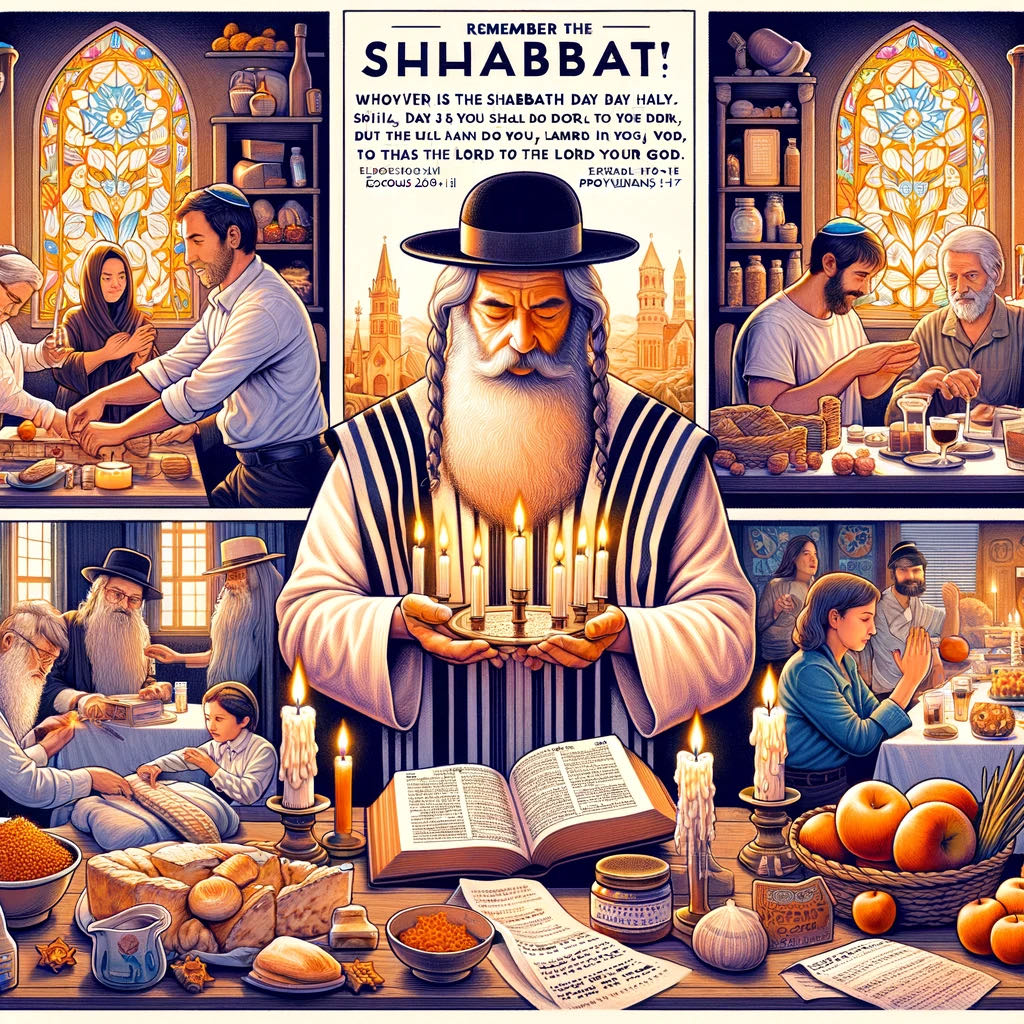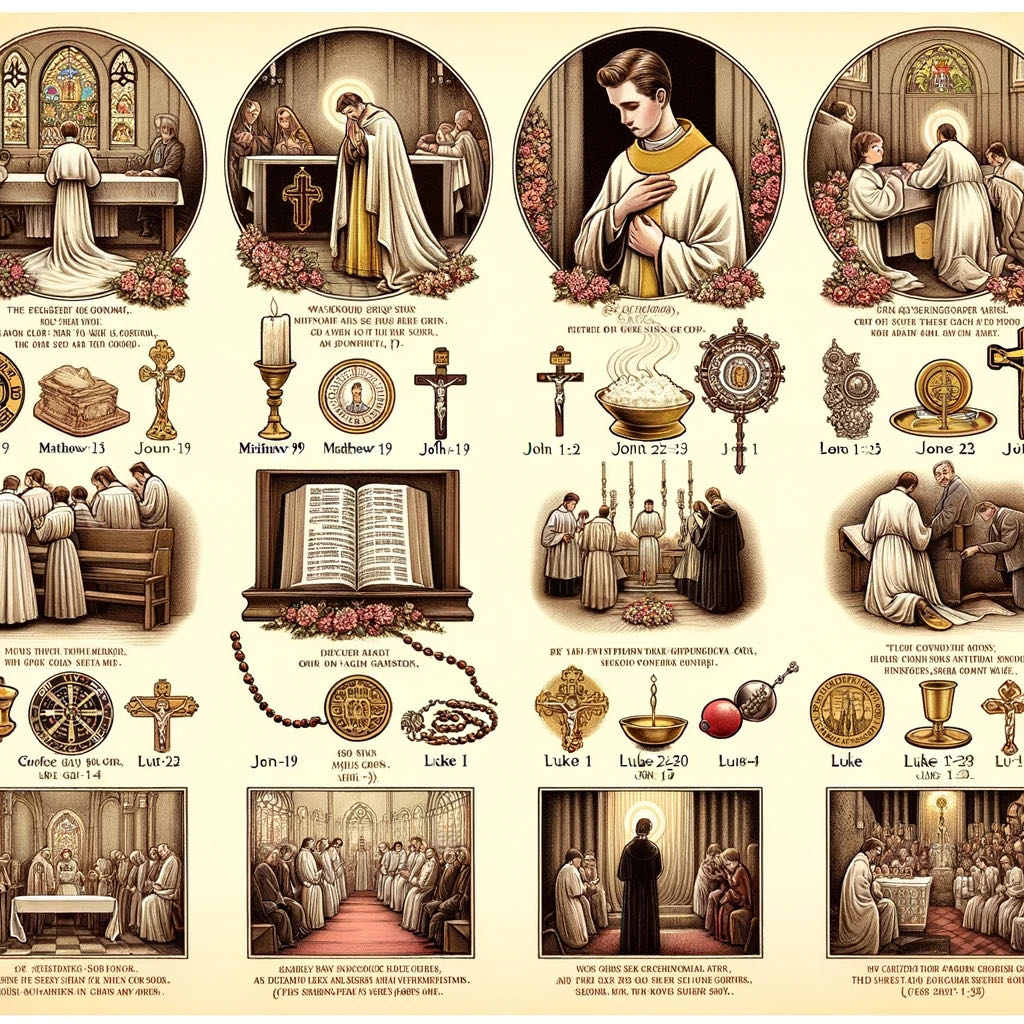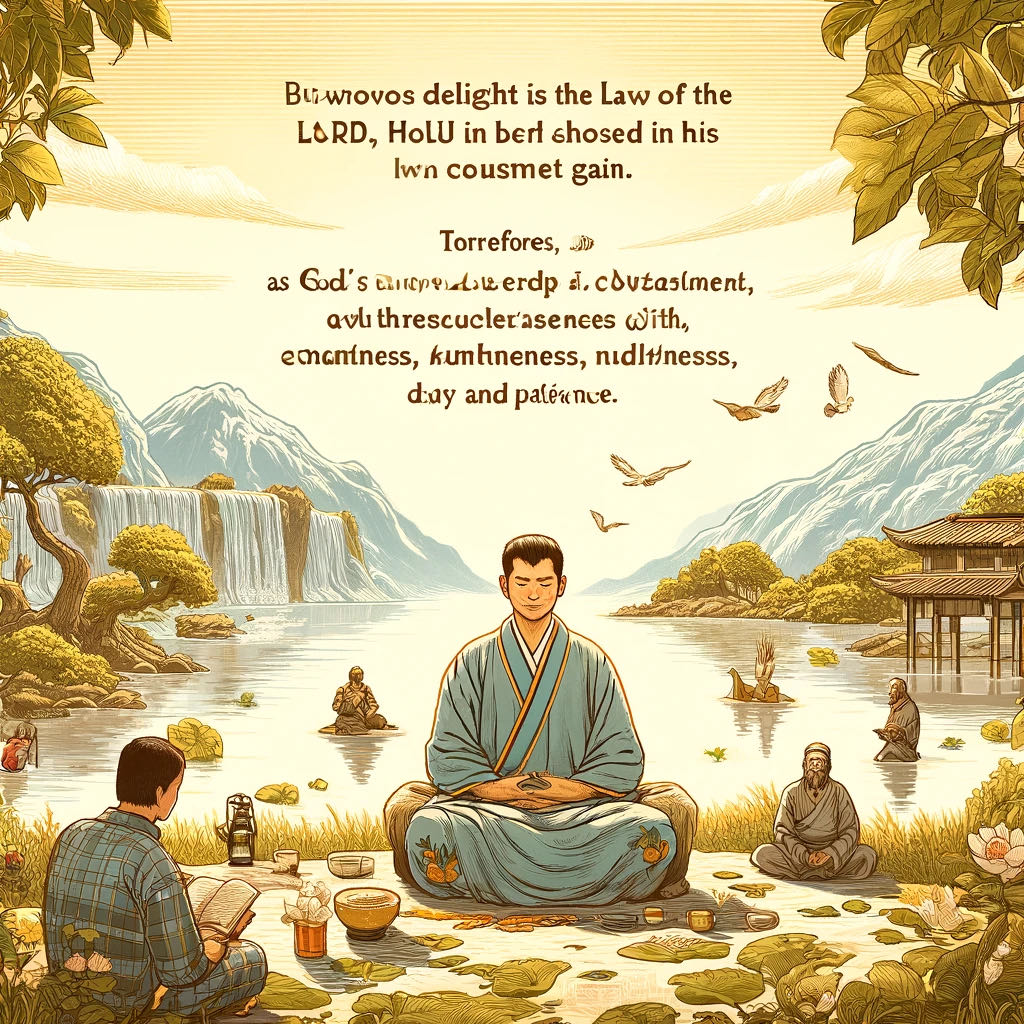本文选取了犹太教、天主教、伊斯兰教和儒、释、道修行的主要词语,并站在基督教圣经释义角度加以解释,方便对应理解:
犹太教

犹太教的主要关键词及圣经的对应释义:
Torah (律法)
解释:犹太教的核心经文,包括摩西五经,指导信仰和生活。
圣经:基督教认为新约的耶稣是律法的成全,强调恩典和信仰的救赎,而不仅是遵循律法。
Mitzvot (诫命)
解释:613条诫命,指导犹太人生活的方方面面。
圣经:基督教认为信仰耶稣是救赎的关键,而不是通过遵守大量的律法和诫命。
Shabbat (安息日)
解释:每周的休息和崇拜日,遵守神的诫命。
圣经:基督教认为安息日是预表基督的安息,强调在基督里的自由,而不是严格遵守特定的一天。
Kosher (洁食律)
解释:饮食法规,规定哪些食物可以吃,如何准备。
圣经:基督教认为在基督里所有食物都是洁净的,不再需要遵守旧约的饮食规定。
Tefillin (经匣)
解释:在祷告时佩戴的皮匣,里面装有经文,提醒遵守律法。
圣经:基督教强调内心的信仰和与神的关系,而不是外在的仪式和符号。
Tzedakah (慈善)
解释:行善和捐献,帮助穷人和需要帮助的人。
圣经:基督教同样强调慈善,但认为行善是信仰的结果,而不是获得神悦纳的手段。
Shema (示玛祷文)
解释:犹太教的核心祷文,宣告对神的独一信仰。
圣经:基督教也重视对神的敬拜,但强调通过耶稣基督与神的关系。
Yom Kippur (赎罪日)
解释:一年一度的赎罪日,进行忏悔和赎罪。
圣经:基督教认为耶稣的牺牲一次性地完成了赎罪,不再需要年度的赎罪仪式。
Halacha (犹太法律)
解释:犹太法律体系,指导日常生活和宗教仪式。
圣经:基督教认为旧约的法律是影子,基督是实质,强调在基督里的新生命。
Bar/Bat Mitzvah (成人礼)
解释:犹太青少年的成人礼,标志着承担宗教和道德责任。
圣经:基督教没有类似的仪式,强调个人信仰和悔改的重要性,而不是年龄和仪式。
Kabbalah (卡巴拉)
解释:神秘主义学派,解释神、宇宙和人类的关系。
圣经:基督教警惕神秘主义,强调神的启示通过圣经清楚明了地表达,而不是通过隐秘知识。
Mezuzah (门框经文)
解释:附在门框上的小匣,内有经文,提醒神的同在。
圣经:基督教认为信仰应在心中,而不是通过外在的符号表达。
天主教

天主教的主要关键词及圣经的对应释义:
圣餐(Eucharist)
解释:圣餐礼是天主教弥撒中的中心仪式,认为圣饼和圣酒变成基督的身体和血。
圣经:基督教其他教派通常认为圣餐是象征性的纪念,而不是实质变成基督的身体和血。
圣母玛利亚(Mary)
解释:天主教高度敬拜玛利亚,认为她是无罪受孕的,并且在天上代祷。
圣经:基督教其他教派尊重玛利亚,但不认为她有无罪受孕或代祷的角色,强调基督是唯一的中保。
圣人崇拜(Saints Veneration)
解释:天主教信徒可以向被封圣的人祈祷,求其代祷。
圣经:基督教其他教派强调信徒只能向神祈祷,反对任何形式的圣人崇拜。
告解(Confession)
解释:信徒向神父告解罪行,神父代替基督赦罪。
圣经:基督教其他教派强调每个人直接向神忏悔,无需通过神职人员。
炼狱(Purgatory)
解释:天主教教义中,炼狱是死后灵魂净化的地方,为最终进入天堂做准备。
圣经:基督教其他教派否认炼狱的存在,认为救赎在今生完成,死后灵魂直接面对审判。
玫瑰经(Rosary)
解释:一种重复的祷告形式,主要用来祈祷玛利亚。
圣经:基督教其他教派认为这种重复祷告形式不符合圣经教导,主张直接与神的个人对话。
圣物(Sacramentals)
解释:圣物如圣水、圣像等,被认为具有神圣的力量和祝福。
圣经:基督教其他教派不承认物品本身具有神圣力量,认为祝福和救恩来自神本身。
朝圣(Pilgrimage)
解释:信徒前往圣地如罗马或圣地耶路撒冷进行宗教旅行。
圣经:基督教其他教派认为朝圣虽然有益,但不是必须的宗教义务。
礼拜仪式(Liturgy)
解释:天主教重视正式的礼拜仪式和礼拜仪式中的圣礼。
圣经:基督教其他教派强调内心的敬拜和个人与神的关系,而不是形式化的礼仪。
独身制(Celibacy)
解释:天主教规定神职人员必须独身,以专注于宗教服务。
圣经:基督教其他教派允许神职人员结婚,认为婚姻是神的赐福。
圣礼(Sacraments)
解释:天主教认为有七圣礼,分别是洗礼、坚振、圣体、告解、病人傅油、圣秩、婚姻。
圣经:基督教其他教派通常只承认洗礼和圣餐两个圣礼,其他五个被认为没有圣经依据。
圣油(Holy Oil)
解释:用于病人傅油圣礼中,被认为带有治愈和赦罪的力量。
圣经:基督教其他教派认为祈祷和信心可以带来治愈,不强调圣油本身的作用。
伊斯兰教

伊斯兰教的主要关键词及基督教圣经的对应释义:
沙赫达(Shahada)
解释:信仰声明:“万物非主,唯有真主,穆罕默德是主的使者。”
圣经:基督教强调三位一体的神,耶稣基督为神的儿子和救主,否认仅凭一神论和穆罕默德为最终使者的说法。
礼拜(Salah)
解释:每天五次祷告,面向麦加。
圣经:基督教提倡随时随地的祷告,认为信徒与神之间的关系不受固定时间和方向的限制。
斋戒(Sawm)
解释:在斋月期间从黎明到日落禁食。
圣经:基督教有时也进行禁食,但不认为这是获得救赎的必要条件,更强调信仰和内心的悔改。
天课(Zakat)
解释:向穷人和需要帮助的人支付2.5%的财富。
圣经:基督教强调自愿的施舍和帮助他人,而不是固定比例的强制捐献。
朝觐(Hajj)
解释:每个穆斯林一生中至少要去麦加朝觐一次。
圣经:基督教认为敬拜神不需要前往特定地点,神无处不在,每个地方都可以与神相遇。
圣战(Jihad)
解释:广义上指为信仰而奋斗,狭义上指战争。
圣经:基督教倡导爱和和平,强调属灵的争战而不是武力对抗。
古兰经(Qur’an)
解释:伊斯兰教的圣书,被认为是安拉的启示。
圣经:基督教认为《圣经》是唯一的神圣启示,否认《古兰经》的神圣性。
清真(Halal)
解释:符合伊斯兰教法的食品和行为。
圣经:基督教并没有严格的饮食律法,强调心灵的洁净胜于外在的规矩。
伊玛目(Imam)
解释:伊斯兰教的宗教领袖,主持礼拜和宗教事务。
圣经:基督教认为每个信徒都可以直接与神沟通,不需要通过特定的宗教领袖。
五行(Five Pillars)
解释:包括信仰声明、礼拜、天课、斋戒和朝觐,是穆斯林信仰和实践的基础。
圣经:基督教强调通过信仰基督和遵循圣经教导来获得救赎,而不是通过遵守一套行为准则。
清洁礼(Wudu)
解释:在礼拜前进行的清洁仪式。
圣经:基督教认为灵魂的洁净比身体的清洁更重要,通过耶稣基督的赦免来洁净罪。
开斋节(Eid al-Fitr)
解释:斋月结束后的庆祝节日。
圣经:基督教庆祝的主要节日是复活节和圣诞节,强调耶稣的复活和降生。
宰牲节(Eid al-Adha)
解释:纪念亚伯拉罕愿意献祭其子的节日。
圣经:基督教也尊重亚伯拉罕的故事,但强调耶稣是最终的牺牲。
塔利姆(Talim)
解释:宗教教育和学习。
圣经:基督教也重视宗教教育,但内容和重点有所不同,强调《圣经》的学习。
儒家

儒家的主要关键词及基督教圣经的对应释义:
仁(Ren)
解释:仁是儒家核心,指的是人与人之间的爱与关怀。
圣经:基督教认为爱是来自上帝,对人的爱是基于对上帝的爱,而不是通过自身修养得来。
礼(Li)
解释:礼指礼仪和礼节,是维持社会秩序的准则。
圣经:基督教强调内心的诚实和信仰,而不是外在的礼节。
义(Yi)
解释:义是正义和公正,强调道德和正直。
圣经:基督教认为真正的义来自于上帝,而不是通过个人道德修养。
智(Zhi)
解释:智是智慧,指的是对道德和伦理的理解。
圣经:基督教的智慧来源于圣经和上帝的启示,而不是通过哲学思考获得的。
信(Xin)
解释:信是诚信和信任,强调人与人之间的信任关系。
圣经:基督教认为信仰的基础是对上帝的信任,而不是单纯的人际信任。
孝(Xiao)
解释:孝是对父母和长辈的尊敬和奉养。
圣经:基督教同样强调孝道,但更重要的是对上帝的顺服和敬畏。
忠(Zhong)
解释:忠是对国家和君主的忠诚。
圣经:基督教强调首先要对上帝忠诚,然后才是对国家和领导的忠诚。
修身(Self-cultivation)
解释:修身是通过个人修养提升道德品质。
圣经:基督教认为人的改变是通过圣灵的工作,而不是单靠个人的努力。
齐家(Regulating the Family)
解释:齐家是通过管理好家庭来实现社会和谐。
圣经:基督教认为家庭和谐是基于对上帝的信仰和顺服,而不是仅靠家长的管理。
治国(Governing the State)
解释:治国是通过治理好国家实现天下大治。
圣经:基督教强调上帝的国度,治理国家应遵循上帝的公义和律法。
平天下(Bringing Peace to the World)
解释:平天下是通过个人修养和国家治理最终实现世界和平。
圣经:基督教认为真正的和平来自于基督的和平,而不是人类自身的努力。
中庸(Doctrine of the Mean)
解释:中庸强调平衡和适度,是儒家重要的处世原则。
圣经:基督教强调真理和信仰的坚定,不是追求中庸之道的平衡。
格物致知(Investigation of Things to Extend Knowledge)
解释:通过研究事物达到知识和智慧。
圣经:基督教认为知识和智慧来自上帝的启示,而不是仅靠人的研究。
诚意(Sincerity)
解释:诚意是内心的真诚和诚信。
圣经:基督教强调心灵的纯洁来自对上帝的信仰,而不是自我修养。
正心(Rectifying the Heart)
解释:正心是通过内心的正直达到外在的行为正当。
圣经:基督教认为内心的改变是通过圣灵的作用,而不是自我修行。
佛教

佛教修行的主要关键词及基督教圣经的对应释义:
涅槃(Nirvana)
解释:涅槃是指彻底摆脱生死轮回的解脱状态。
圣经:基督教强调永生和天堂,通过信仰基督得救,而不是通过自身修行达到解脱。
业力(Karma)
解释:业力指个人行为的因果关系,决定了未来的命运。
圣经:基督教相信神的主权和恩典,而不是个人行为积累来决定未来的命运。
轮回(Reincarnation)
解释:轮回是指灵魂在多个生命中转世的过程。
圣经:基督教不认可轮回转世,强调一次生命,之后是审判和永生或永罚。
八正道(Eightfold Path)
解释:佛教修行的八个方面,包括正见、正思维、正语、正业、正命、正精进、正念和正定。
圣经:基督教的救赎是通过信仰和恩典,而不是通过遵循一套行为准则来实现灵魂的救赎。
四圣谛(Four Noble Truths)
解释:佛教关于苦、苦因、苦灭、苦灭道的四个基本真理。
圣经:基督教认为痛苦是因罪而生,通过基督的救赎可以得解脱,而不是通过认识和消除渴望。
菩提心(Bodhicitta)
解释:发愿成佛以救度一切众生的心愿。
圣经:基督教强调通过信仰基督,获得神的恩典和圣灵的引导,而不是通过发愿成佛来救度众生。
禅定(Meditation)
解释:通过深度的冥想达到内心的宁静和觉悟。
圣经:基督教的祷告与冥想有根本不同,祷告是与神的对话,而不是内观和自省。
慈悲(Compassion)
解释:对一切众生的无条件的爱和同情。
圣经:基督教也强调慈悲,但其基础是对神的爱和对他人的爱,而不是通过自我修行获得的德行。
无常(Impermanence)
解释:一切事物都是暂时的,皆在变化之中。
圣经:基督教承认世间事物的短暂,但强调神的永恒和人的灵魂的永生。
五戒(Five Precepts)
解释:不杀生、不偷盗、不邪淫、不妄语、不饮酒五条基本戒律。
圣经:基督教强调十诫和对神的顺服,而不是通过戒律来实现个人道德的完善。
空性(Emptiness)
解释:一切事物皆无独立实性,皆为空。
圣经:基督教强调神的存在和创造的真实,而不是万物皆空的观念。
正念(Mindfulness)
解释:保持对当下每一刻的觉察和关注。
圣经:基督教重视心灵的警醒和祷告,而不是通过正念修行来达到内心的平静。
自性(Self-nature)
解释:一切众生本具佛性。
圣经:基督教强调人因原罪而有罪性,需要通过基督的救赎,而不是通过自性觉悟来解脱。
般若(Prajna)
解释:超越世俗的智慧。
圣经:基督教智慧来源于圣经和神的启示,而不是通过般若智慧的修行。
五蕴(Five Aggregates)
解释:色、受、想、行、识五种存在的要素。
圣经:基督教不强调通过分解自我成分来了解人性,而是通过信仰基督了解自己和神。
十二因缘(Twelve Links of Dependent Origination)
解释:解释生命轮回和痛苦起源的十二个因果环节。
圣经:基督教信仰认为人生的目的和解脱在于与神的关系,而不是因缘和合的循环。
无我(No-self)
解释:没有恒常不变的自我。
圣经:基督教认为每个人都是神独特的创造,有独特的灵魂,而不是没有固定自我的存在。
解脱(Liberation)
解释:摆脱轮回和痛苦的最终目标。
圣经:基督教的解脱是通过基督的救赎,而不是通过自身的修行和智慧达到解脱。
禅那(Dhyana)
解释:通过禅修获得的深度专注和宁静状态。
圣经:基督教强调的是默想神的话语和祷告,而不是通过禅修达到内心的宁静。
正见(Right View)
解释:了解四圣谛和因果业报的正确观念。
圣经:基督教的正见是通过圣经的教导和神的启示,而不是通过理解四谛和业力。
六波罗蜜(Six Paramitas)
解释:布施、持戒、忍辱、精进、禅定、般若六种修行方法。
圣经:基督教的善行是出于对神的爱和对他人的爱,而不是为了自我修行和解脱。
正语(Right Speech)
解释:言语诚实、不妄语、不恶口、不绮语。
圣经:基督教强调的是爱人如己,说话要出于爱心,而不是通过正语修行来净化自我。
正业(Right Action)
解释:行为正当,不杀生、不偷盗、不邪淫。
圣经:基督教的行为准则是基于神的诫命和基督的教导,而不是通过正业修行来积累功德。
正命(Right Livelihood)
解释:选择正当的职业,不从事伤害他人的工作。
圣经:基督教认为职业应该荣耀神和服务他人,而不是仅仅为了避免不正当的谋生手段。
正精进(Right Effort)
解释:努力修行,避免不善的行为和思想。
圣经:基督教强调的是依靠圣灵的力量,而不是仅靠个人的努力和精进修行。
正念(Right Mindfulness)
解释:保持觉知,清醒地观察和感知当下。
圣经:基督教强调不断在神的引导下生活,而不是仅通过自我觉察来保持正念。
正定(Right Concentration)
解释:通过禅定达到专注的心境。
圣经:基督教的专注是对神的专注和祷告,而不是通过禅定达到内心的集中。
十善(Ten Virtues)
解释:十种善行,包括不杀生、不偷盗、不邪淫等。
圣经:基督教强调信仰和行为的结合,而不仅是通过十善修行来积累善业。
三宝(Three Jewels)
解释:佛、法、僧三种宝贵的依靠。
圣经:基督教的信仰中心是三位一体的神,而不是佛、法、僧三宝。
三学(Three Trainings)
解释:戒、定、慧三种修行。
圣经:基督教强调的是通过信仰基督得救,而不是通过戒、定、慧三学修行达到解脱。
道教

道教修行的主要关键词及基督教圣经的对应释义:
道(Tao)
解释:道是宇宙的终极原则,万物的根源。
圣经:基督教认为唯一的终极原则是上帝,而不是抽象的道。
无为(Wu Wei)
解释:顺应自然,不刻意作为。
圣经:基督教强调积极行善和服侍神,而不是无为的生活态度。
气(Qi)
解释:生命的能量,存在于一切生物体中。
圣经:基督教不认可气的概念,认为生命源自于上帝的创造。
阴阳(Yin-Yang)
解释:宇宙中相互对立又互相依存的两种力量。
圣经:基督教强调上帝的绝对主权,没有阴阳对立的二元论。
内丹(Inner Alchemy)
解释:通过修炼内丹达到长生不老和精神觉悟。
圣经:基督教认为永生是通过信仰基督得到的,而不是通过炼丹修炼。
炼气化神(Transforming Qi into Spirit)
解释:通过气功和冥想将气转化为精神力量。
圣经:基督教强调祈祷和圣灵的力量,而不是内在的气功修炼。
静坐(Meditation)
解释:通过静坐冥想来获得内心的平静和精神提升。
圣经:基督教的默想是与神的对话,不是自我内观和冥想。
长生(Immortality)
解释:通过修炼达到长生不老。
圣经:基督教认为永生是通过信仰基督得救,而不是通过人自身的修炼。
道德经(Tao Te Ching)
解释:道教经典,阐述道和德的关系及修行之道。
圣经:基督教认为圣经是唯一的启示,不接受其他宗教经典。
天人合一(Unity of Heaven and Man)
解释:人与自然、宇宙和谐共存。
圣经:基督教强调人与上帝的关系,而不是人与自然的合一。
符箓(Talismans)
解释:用以驱邪避凶的符咒。
圣经:基督教认为应依靠上帝的保护,而不是依赖符咒。
静观(Contemplation)
解释:通过静观自然和宇宙的变化来理解道。
圣经:基督教强调通过祷告和圣经理解上帝的旨意,而不是通过观察自然。
玄学(Metaphysics)
解释:探讨宇宙的根本性质和生命的终极问题。
圣经:基督教认为这些问题的答案在圣经中,上帝已经揭示了一切真理。
修仙(Immortal Cultivation)
解释:通过修炼达到仙人的境界。
圣经:基督教认为人的最终归宿是天堂或地狱,不存在成为仙人的境界。
斋戒(Fasting)
解释:通过斋戒净化身心。
圣经:基督教也有斋戒,但其目的是为了更好地敬拜和依靠上帝,而不是修炼身体。
上述解释是以基督信仰对主流文化中的一些宗教信仰对应的解释,方便学习参考,如有不当之处请指出。
(如有建议敬请留言讨论,邮箱:[email protected])
Christian Biblical Exegesis of Key Terms in Judaism, Catholicism, Islam, and Confucianism/Buddhism/Taoism
This study selects key terms from the spiritual practices of Judaism, Catholicism, Islam, Confucianism, Buddhism, and Taoism or Daoism, providing interpretations through the lens of Christian biblical exegesis to facilitate cross-religious understanding.
Judaism

Torah (Law):
Explanation: The Torah is the core scripture of Judaism (primarily the Five Books of Moses), which guides Jewish faith and daily life.
Biblical Interpretation (Christian Perspective): Christianity teaches that Jesus fulfills the Law; while the Old Testament law remains as a moral guideline, salvation comes through grace and faith in Christ rather than by merely following the law.
Mitzvot (Commandments):
Explanation: Mitzvot refer to the 613 commandments that govern nearly every aspect of Jewish life.
Biblical Interpretation: Christianity emphasizes that faith in Jesus is the key to salvation rather than strict adherence to a multitude of laws and commandments.
Shabbat (Sabbath):
Explanation: The Sabbath is a weekly day of rest and worship in obedience to God’s command.
Biblical Interpretation: Christians see the Sabbath as a foreshadowing of the rest found in Christ—emphasizing freedom in Him rather than a rigid observance of one specific day.
Kosher (Dietary Laws):
Explanation: Kosher regulations dictate which foods may be eaten and how they must be prepared.
Biblical Interpretation: In Christ, all foods are considered clean; the dietary restrictions of the Old Testament are no longer binding on believers.
Tefillin (Phylacteries):
Explanation: Tefillin are leather boxes containing biblical passages worn during prayer as reminders to obey the law.
Biblical Interpretation: Christianity stresses that faith should be an internal matter—a personal, heart-centered relationship with God—rather than a matter of outward rituals and symbols.
Tzedakah (Charity):
Explanation: Tzedakah involves acts of righteousness— giving charity and helping those in need.
Biblical Interpretation: While charity is also important in Christianity, it is understood as the fruit of faith rather than a transactional means to gain God’s favor.
Shema (The Shema Prayer):
Explanation: The Shema is a central declaration of the Jewish faith, affirming the oneness of God.
Biblical Interpretation: Christians also highly value worship of God, though they emphasize the relationship with God through Jesus Christ as the ultimate expression of that faith.
Yom Kippur (Day of Atonement):
Explanation: Yom Kippur is the annual day of atonement in which Jews engage in repentance and seek forgiveness.
Biblical Interpretation: Christians believe that the sacrifice of Jesus once and for all secures atonement for sins, eliminating the need for an annual atonement ritual.
Halacha (Jewish Law):
Explanation: Halacha is the comprehensive system of Jewish law governing daily conduct and religious rituals.
Biblical Interpretation: Christianity views the Old Testament law as a shadow of things to come, with Christ being the substance—emphasizing a new life in Him rather than strict adherence to the old legal codes.
Bar/Bat Mitzvah (Coming-of-Age Ceremony):
Explanation: This ceremony marks the transition of Jewish youth into religious and moral responsibility.
Biblical Interpretation: Christianity does not have an equivalent ritual; it emphasizes personal faith and repentance as the basis for one’s relationship with God, irrespective of age or ceremonial milestones.
Kabbalah (Jewish Mysticism):
Explanation: Kabbalah is a mystical tradition that seeks to explain the relationship between God, the universe, and humanity.
Biblical Interpretation: Christianity is generally cautious about mystical approaches, emphasizing that God’s revelation is made clear through the Bible rather than through secret or esoteric knowledge.
Mezuzah (Doorpost Scroll):
Explanation: A Mezuzah is a small case affixed to doorposts, containing biblical texts as a reminder of God’s presence.
Biblical Interpretation: Christians emphasize that true faith is internal and that one’s heart—not external symbols—should be the dwelling place for God.
Catholicism

Eucharist (Holy Communion):
Explanation: The Eucharist is the central rite of the Catholic Mass, in which the bread and wine are believed to become the actual body and blood of Christ.
Biblical Interpretation: While many Christians regard Holy Communion as a memorial of Christ’s sacrifice, most non-Catholic denominations do not hold that the elements literally transform, but rather symbolize Christ’s body and blood.
Mary (The Blessed Virgin):
Explanation: Catholics hold Mary in high esteem, believing in her immaculate conception and her role as an intercessor in heaven.
Biblical Interpretation: Other Christian traditions respect Mary as the mother of Jesus but do not attribute to her the doctrines of immaculate conception or a mediating role, emphasizing that Christ is the sole mediator between God and man.
Veneration of Saints:
Explanation: Catholics practice the veneration of saints by praying for their intercession.
Biblical Interpretation: Many Protestants and other Christian groups teach that believers should pray only to God, rejecting any form of saint veneration.
Confession (Sacrament of Reconciliation):
Explanation: In confession, Catholics confess sins to a priest, who then grants absolution in Jesus’ name.
Biblical Interpretation: Other Christian traditions stress direct confession to God without the necessity of an intermediary priest.
Purgatory:
Explanation: Catholic doctrine teaches that purgatory is a temporary state in which souls are purified before entering heaven.
Biblical Interpretation: Most other Christian denominations reject the concept of purgatory, holding that salvation and forgiveness are fully granted in this life through faith, with the soul facing immediate judgment upon death.
Rosary:
Explanation: The Rosary is a form of meditative prayer involving repetitive recitation of prayers, primarily in honor of Mary.
Biblical Interpretation: Many other Christians believe that such repetitive prayer practices do not align with biblical instruction, advocating instead for direct, personal conversation with God.
Sacramentals:
Explanation: Sacramentals include items such as holy water and religious images, which are believed to carry divine blessing and power.
Biblical Interpretation: Other Christian groups do not ascribe inherent sanctity to objects, believing that blessing and salvation come solely from God.
Pilgrimage:
Explanation: Pilgrimage refers to religious journeys to sacred places (e.g., Rome or Jerusalem).
Biblical Interpretation: While pilgrimage can be valuable, most non-Catholic Christians do not view it as a religious obligation, teaching instead that true worship of God occurs wherever one may be.
Liturgy (Formal Worship Services):
Explanation: Catholic worship places great emphasis on formal liturgical ceremonies and the sacraments as the center of worship.
Biblical Interpretation: Many other Christian traditions focus on heart-felt, personal worship rather than adhering strictly to formal rites.
Celibacy:
Explanation: Catholic doctrine requires that clergy remain celibate in order to devote themselves entirely to God’s service.
Biblical Interpretation: Most Protestant denominations allow clergy to marry, viewing marriage as a blessing rather than a barrier to effective ministry.
Sacraments:
Explanation: Catholics recognize seven sacraments (Baptism, Confirmation, Eucharist, Penance, Anointing of the Sick, Holy Orders, and Marriage).
Biblical Interpretation: Many non-Catholic churches typically recognize only Baptism and the Lord’s Supper as sacraments, arguing that the other rites lack clear biblical sanction.
Holy Oil:
Explanation: Holy oil is used in the sacrament of anointing the sick, believed to convey healing and forgiveness.
Biblical Interpretation: Other Christian traditions contend that prayer and faith are the primary means of healing, and do not assign special sacramental power to anointing oil.
Islam

Shahada (Declaration of Faith):
Explanation: The Shahada is the Islamic testimony: “There is no god but Allah, and Muhammad is His messenger.”
Biblical Interpretation: Christianity teaches a Trinitarian view of God, affirming that Jesus Christ is the Son of God and Savior—thus rejecting a solely monotheistic declaration that omits Christ and affirms Muhammad as the final messenger.
Salah (Prayer):
Explanation: Salah is the practice of praying five times a day while facing Mecca.
Biblical Interpretation: Christianity encourages believers to pray at all times and in all places, emphasizing a personal and ongoing relationship with God unconstrained by fixed times or directions.
Sawm (Fasting):
Explanation: Sawm refers to the fasting observed during the month of Ramadan, from dawn to sunset.
Biblical Interpretation: While Christians also practice fasting at times, it is not viewed as a requirement for salvation but as a means of sincere repentance and spiritual focus.
Zakat (Almsgiving):
Explanation: Zakat is the compulsory giving of 2.5% of one’s wealth to those in need.
Biblical Interpretation: Christian teachings stress voluntary generosity and charitable giving that flows from genuine love and compassion, rather than a fixed mandatory amount.
Hajj (Pilgrimage):
Explanation: Hajj is the pilgrimage to Mecca that every Muslim must undertake at least once in their lifetime.
Biblical Interpretation: Christianity holds that worship of God does not require visiting a particular sacred location, for God is present everywhere and can be encountered in every place.
Jihad (Struggle/Striving):
Explanation: Jihad can broadly refer to striving for the sake of faith, though in its narrow sense it may denote armed struggle.
Biblical Interpretation: Christianity advocates for love and peace, emphasizing a spiritual battle against sin rather than physical conflict.
Qur’an (Holy Book):
Explanation: The Qur’an is the Islamic holy book, regarded as the literal revelation of Allah.
Biblical Interpretation: Christianity holds that the Bible is the sole divinely inspired scripture and does not recognize the Qur’an as a part of God’s revelation.
Halal (Permissible):
Explanation: Halal refers to that which is permissible under Islamic law, especially with regard to food and behavior.
Biblical Interpretation: Christianity does not observe a strict set of dietary laws, emphasizing instead the purity of the heart over external regulations.
Imam (Religious Leader):
Explanation: An Imam is a leader in the Islamic faith who presides over prayers and religious affairs.
Biblical Interpretation: Christianity teaches that every believer has direct access to God through Christ and does not require an appointed intermediary for prayer.
Five Pillars of Islam:
Explanation: These are the five basic acts of worship and the foundation of Muslim life: the declaration of faith (Shahada), prayer (Salah), fasting (Sawm), almsgiving (Zakat), and pilgrimage (Hajj).
Biblical Interpretation: Christian doctrine emphasizes salvation through faith in Christ and adherence to biblical teachings rather than adherence to a fixed set of prescribed rituals.
Wudu (Ablution):
Explanation: Wudu is the ritual washing performed before prayers.
Biblical Interpretation: Christianity places greater importance on the cleansing of the soul through Jesus’ forgiveness rather than on physical washing.
Eid al-Fitr (Festival of Breaking the Fast):
Explanation: Eid al-Fitr is the celebration marking the end of Ramadan.
Biblical Interpretation: Christianity celebrates major feasts such as Easter and Christmas, which focus on the resurrection and the birth of Jesus, respectively.
Eid al-Adha (Festival of Sacrifice):
Explanation: Eid al-Adha commemorates the willingness of Abraham to sacrifice his son.
Biblical Interpretation: While Christianity honors Abraham’s faith, it emphasizes that Jesus is the final and ultimate sacrifice.
Talim (Religious Education):
Explanation: Talim refers to the religious instruction and learning in Islam.
Biblical Interpretation: Christianity also values religious education, focusing particularly on the study of the Bible as the definitive source of God’s revelation.
Confucianism

Ren (仁 – Benevolence):
- Explanation: Ren is at the heart of Confucianism; it refers to the love and care between people.
- Biblical Interpretation: Christianity teaches that love comes from God. Love for others is based on the love for God—not merely the result of self-cultivation.
Li (礼 – Propriety):
- Explanation: Li refers to proper rites and etiquette, serving as the guidelines that maintain social order.
- Biblical Interpretation: Christianity emphasizes inner honesty and faith rather than mere external rituals or formalities.
Yi (义 – Righteousness):
- Explanation: Yi means justice and fairness, with an emphasis on moral integrity and uprightness.
- Biblical Interpretation: Christianity holds that true righteousness comes from God and is not merely achieved through personal moral cultivation.
Zhi (智 – Wisdom):
- Explanation: Zhi denotes wisdom, particularly the understanding of morality and ethics.
- Biblical Interpretation: Christian wisdom is understood to flow from the Scriptures and God’s revelation rather than from human philosophical reasoning alone.
Xin (信 – Faith/Integrity):
- Explanation: Xin stands for trust, faithfulness, and mutual confidence between people.
- Biblical Interpretation: In Christianity, the foundation of faith is trust in God—not solely interpersonal trust.
Xiao (孝 – Filial Piety):
- Explanation: Xiao means respecting and caring for one’s parents and elders.
- Biblical Interpretation: While Christianity also emphasizes honoring one’s parents, it places even greater importance on obedience to and reverence for God.
Zhong (忠 – Loyalty):
- Explanation: Zhong refers to loyalty toward the state or ruler.
- Biblical Interpretation: Christianity teaches that our primary loyalty must be to God, and only thereafter to earthly authorities.
Self-Cultivation (修身):
- Explanation: This means cultivating one’s character and moral quality through personal effort.
- Biblical Interpretation: Christianity asserts that true transformation comes through the work of the Holy Spirit rather than by human effort alone.
Regulating the Family (齐家):
- Explanation: This refers to managing one’s household well as a means to create a harmonious society.
- Biblical Interpretation: Christianity views family harmony as rooted in a relationship with and obedience to God, not merely through parental governance.
Governing the State (治国):
- Explanation: Governing the state involves managing the country in a way that brings about overall peace and order.
- Biblical Interpretation: Christianity emphasizes the Kingdom of God; when governing, earthly rulers are expected to follow God’s righteousness and law.
Bringing Peace to the World (平天下):
- Explanation: This means, through personal cultivation and good governance, ultimately realizing world peace.
- Biblical Interpretation: Christianity teaches that true peace comes from Christ’s peace, not solely from human efforts.
Doctrine of the Mean (中庸):
- Explanation: The Doctrine of the Mean stresses balance and moderation and is a key practical principle in Confucian thought.
- Biblical Interpretation: Christianity emphasizes steadfastness in truth and faith rather than striving for a mere middle ground.
Investigation of Things to Extend Knowledge (格物致知):
- Explanation: This means studying matters in-depth to gain knowledge and wisdom.
- Biblical Interpretation: In Christianity, knowledge and wisdom are believed to come from God’s revelation rather than from human inquiry alone.
Sincerity (诚意):
- Explanation: Sincerity refers to the genuineness and honesty of one’s heart.
- Biblical Interpretation: Christianity teaches that the purity of one’s heart comes from a relationship with God, not solely through self-improvement.
Rectifying the Heart (正心):
- Explanation: This means bringing the heart into proper order so that one’s outward actions are righteous.
- Biblical Interpretation: Christianity holds that inner transformation is the work of the Holy Spirit rather than a product of self-discipline alone.
Buddhism

Nirvana (涅槃):
- Explanation: Nirvana is the state of ultimate liberation, the complete release from the cycle of birth and rebirth.
- Biblical Interpretation: Christianity emphasizes eternal life and heaven through salvation in Christ, rather than achieving liberation through personal ascetic practice.
Karma (业力):
- Explanation: Karma refers to the law of cause and effect, where one’s actions determine future outcomes.
- Biblical Interpretation: Christianity teaches that destiny is governed by God’s sovereign grace rather than by the accumulation of personal deeds.
Reincarnation (轮回):
- Explanation: Reincarnation is the belief that the soul repeatedly takes on new lives.
- Biblical Interpretation: Christianity rejects reincarnation, emphasizing one life followed by judgment and either eternal life or eternal punishment.
Eightfold Path (八正道):
- Explanation: The Eightfold Path outlines eight aspects of Buddhist practice, including right view, right intention, right speech, right action, right livelihood, right effort, right mindfulness, and right concentration.
- Biblical Interpretation: In Christianity, redemption comes through faith and grace, not by following a prescribed set of behavioral guidelines to attain salvation.
Four Noble Truths (四圣谛):
- Explanation: These truths explain the nature of suffering, its origin, cessation, and the path to its cessation.
- Biblical Interpretation: Christianity teaches that suffering originates from sin and that deliverance is available through Christ’s redemptive work, not merely by understanding or eliminating desire.
Bodhicitta (菩提心):
- Explanation: Bodhicitta is the aspiration to achieve Buddhahood for the benefit of all beings.
- Biblical Interpretation: Christianity emphasizes that grace is received through faith in Christ, not by aspiring to become enlightened to save all beings.
Meditation (禅定):
- Explanation: Meditation in Buddhism refers to deep, concentrated contemplation aimed at achieving inner peace and insight.
- Biblical Interpretation: While Christianity values prayer and contemplation of God’s Word, its focus is on direct communication with God rather than merely internal self-observation.
Compassion (慈悲):
- Explanation: Compassion in Buddhism is the unconditional love and empathy extended to all beings.
- Biblical Interpretation: Christianity also emphasizes compassion, basing it on God’s love and the commandment to love one another, rather than through self-cultivated virtue.
Impermanence (无常):
- Explanation: Impermanence is the notion that all things are temporary and subject to change.
- Biblical Interpretation: Christianity acknowledges the fleeting nature of worldly things but stresses the eternal nature of God and the everlasting life of the soul.
Five Precepts (五戒):
- Explanation: The Five Precepts are basic ethical guidelines in Buddhism: to abstain from killing, stealing, sexual misconduct, lying, and intoxication.
- Biblical Interpretation: Christianity emphasizes the Ten Commandments and obedience to God rather than a fixed set of precepts to perfect personal morality.
Emptiness (空性):
- Explanation: Emptiness is the concept that all things lack an independent, permanent essence.
- Biblical Interpretation: Christianity teaches the reality of God’s creation and the enduring nature of God rather than asserting that everything is inherently empty.
Mindfulness (正念):
- Explanation: Mindfulness means remaining aware and attentive to every moment.
- Biblical Interpretation: Christianity places more emphasis on spiritual watchfulness and prayer rather than on mindfulness practices per se.
Self-nature (自性):
- Explanation: Self-nature is the inherent Buddha- nature present in all beings.
- Biblical Interpretation: Christianity teaches that all humans are born with a sinful nature due to original sin and require redemption through Christ rather than discovering an inherent enlightened nature.
Prajna (般若):
- Explanation: Prajna represents transcendent wisdom beyond worldly concerns.
- Biblical Interpretation: In Christianity, wisdom is viewed as coming from God’s revelation in the Bible rather than through esoteric spiritual practice.
Five Aggregates (五蕴):
- Explanation: These refer to the five components of personal existence—form, sensation, perception, mental formations, and consciousness.
- Biblical Interpretation: Christianity does not typically analyze human nature by breaking it into components; instead, it emphasizes understanding oneself and God through one’s relationship with Christ.
Twelve Links of Dependent Origination (十二因缘):
- Explanation: This teaching outlines the twelve causal links that explain the cycle of rebirth and the origin of suffering in Buddhism.
- Biblical Interpretation: Christianity posits that the purpose of life and the path to deliverance lie in a relationship with God, not in a cyclical process of cause and effect.
No-Self (无我):
- Explanation: No-self is the doctrine that there is no permanent, unchanging self.
- Biblical Interpretation: Christianity asserts that each person is a unique creation of God with an individual soul, rather than having no fixed identity.
Liberation (解脱):
- Explanation: Liberation refers to the ultimate goal of breaking free from the cycle of rebirth and suffering.
- Biblical Interpretation: In Christianity, liberation (or salvation) is achieved through the redemptive work of Christ—not through personal effort in self-cultivation.
Dhyana (禅那):
- Explanation: Dhyana is a state of deep, focused meditation that leads to tranquility.
- Biblical Interpretation: While Christianity values meditating on God’s Word in prayer, it does not employ dhyana as a means to achieve inner concentration.
Right View (正见):
- Explanation: In Buddhism, right view involves understanding the Four Noble Truths and the law of karma correctly.
- Biblical Interpretation: Christianity’s proper perspective is derived from the teachings of Scripture and divine revelation rather than from an analysis of suffering and karma.
Six Paramitas (六波罗蜜):
- Explanation: The Six Paramitas are six qualities that one should cultivate: generosity, ethical conduct, patience, effort, meditation, and wisdom.
- Biblical Interpretation: Christianity teaches that good works flow from love for God and others rather than being a means to earn merit through self-cultivation.
Right Speech (正语):
- Explanation: This calls for truthful, non-harmful, and proper speech.
- Biblical Interpretation: Christianity emphasizes speaking out of love for others rather than adhering to a formulaic “right speech” designed solely for self- purification.
Right Action (正业):
- Explanation: This means acting righteously— avoiding killing, stealing, and sexual misconduct.
- Biblical Interpretation: Christian ethical conduct is based on God’s commandments and the teachings of Christ, not merely on following a prescribed set of moral exercises.
Right Livelihood (正命):
- Explanation: Choosing an occupation that does not harm others is the goal of right livelihood.
- Biblical Interpretation: Christianity teaches that one’s work should honor God and serve others, rather than being driven solely by the need for material gain.
Right Effort (正精进):
- Explanation: This involves diligently avoiding unwholesome behavior and cultivating wholesome habits.
- Biblical Interpretation: Christianity relies on the power of the Holy Spirit for transformation rather than on sheer human effort alone.
Right Mindfulness (正念):
- Explanation: Maintaining awareness of the present moment is the essence of right mindfulness.
- Biblical Interpretation: In Christianity, continuous spiritual alertness and prayer under God’s guidance are emphasized over techniques of self-aware mindfulness.
Right Concentration (正定):
- Explanation: This is the practice of achieving deep concentration through meditation.
- Biblical Interpretation: Christian focus is attained through prayer and meditation on God’s word, not by following specific techniques for concentrating the mind.
Ten Virtues (十善):
- Explanation: These encompass ten kinds of righteous acts, such as not killing, not stealing, and avoiding sexual misconduct.
- Biblical Interpretation: Christianity upholds a harmonious integration of faith and good works, rooted in God’s commandments, rather than merely practicing a set number of virtues to accrue merit.
Three Jewels (三宝):
- Explanation: In Buddhism, the Three Jewels refer to the Buddha, the Dharma (teaching), and the Sangha (community), which serve as objects of refuge.
- Biblical Interpretation: Christianity centers on the triune God (Father, Son, and Holy Spirit) rather than on the Buddha, Dharma, and Sangha as objects of refuge.
Three Trainings (三学):
- Explanation: The Three Trainings are the practices of discipline (戒), concentration (定), and wisdom (慧).
- Biblical Interpretation: Christianity emphasizes salvation through faith in Christ rather than obtaining liberation through the structured practices of discipline, concentration, and wisdom.
Taoism

Tao (道 – The Way):
- Explanation: Tao is the ultimate principle of the universe and the origin of all things.
- Biblical Interpretation: Christianity holds that the one ultimate principle is God, not an abstract “Tao.”
Wu Wei (无为 – Non-Action/Non-Interference):
- Explanation: Wu Wei refers to the principle of aligning with the natural order and refraining from forced action.
- Biblical Interpretation: Christianity teaches proactive goodness and service to God, rather than a passive “non-action” attitude.
Qi (气 – Vital Energy):
- Explanation: Qi is the life energy believed to permeate all living things.
- Biblical Interpretation: Christianity does not recognize the concept of Qi, maintaining that life originates from God’s creative power.
Yin-Yang (阴阳):
- Explanation: Yin and Yang represent two complementary and opposing forces in the universe that are in constant interplay.
- Biblical Interpretation: Christianity emphasizes the absolute sovereignty of God without resorting to a dualistic concept of opposing forces.
Inner Alchemy (内丹):
- Explanation: Inner alchemy is the Daoist practice of refining one’s inner energy to achieve immortality and spiritual enlightenment.
- Biblical Interpretation: Christianity teaches that eternal life is granted through faith in Christ rather than through alchemical practices.
Transforming Qi into Spirit (炼气化神):
- Explanation: This refers to the process of converting life energy (Qi) into spiritual power through specific exercises and meditation.
- Biblical Interpretation: Christianity emphasizes prayer and the power of the Holy Spirit rather than inward energy transformation.
Meditation (静坐):
- Explanation: Meditation in Daoism is the practice of sitting quietly to cultivate inner peace and spiritual upliftment.
- Biblical Interpretation: While Christianity values meditating on God’s word as a form of prayer, it is not primarily an inward self-inspection but rather a conversation with God.
Immortality (长生):
- Explanation: Immortality refers to the Daoist goal of achieving endless life through cultivation and practice.
- Biblical Interpretation: Christianity teaches that eternal life is received through salvation in Christ—not by one’s own efforts at cultivation.
Tao Te Ching (道德经):
- Explanation: The Tao Te Ching is a foundational Daoist text that expounds on the relationship between the Tao and virtue (Te) and outlines the path of practice.
- Biblical Interpretation: Christianity regards the Bible as the sole divinely inspired revelation and does not accept other religious classics as equal in authority.
Unity of Heaven and Man (天人合一):
- Explanation: This concept describes the harmonious union of humans with nature and the universe.
- Biblical Interpretation: Christianity emphasizes the relationship between humanity and God rather than a complete union with nature.
Talismans (符箓):
- Explanation: Talismans are written symbols or charms used in Daoist practice to ward off evil and ensure good fortune.
- Biblical Interpretation: Christianity teaches that one should rely on God’s protection rather than on amulets or charms.
Contemplation (静观):
- Explanation: Contemplation in Daoism is the practice of observing nature and the changing cosmos to gain understanding of the Tao.
- Biblical Interpretation: Christianity stresses understanding God’s will through prayer and meditation on Scripture, not by mere observation of nature.
Metaphysics (玄学):
- Explanation: Metaphysics in Daoism is the investigation into the fundamental nature of reality and existence.
- Biblical Interpretation: Christianity holds that all truth is revealed in the Bible, where God has disclosed the essential truths of reality.
Immortal Cultivation (修仙):
- Explanation: Immortal cultivation is the Daoist pursuit of achieving a transcendent state akin to that of an immortal being.
- Biblical Interpretation: Christianity teaches that the ultimate destiny of human beings is either eternal life in heaven or eternal separation from God, not a state of becoming an “immortal.”
Fasting (斋戒):
- Explanation: Fasting in Daoism is practiced to purify the body and mind.
- Biblical Interpretation: Christianity also practices fasting, but its purpose is to deepen worship and reliance on God rather than merely to purify oneself.
Note:These interpretations are offered from a Christian perspective for the purpose of comparative study. They summarize how key terms in Confucianism, Buddhism, and Daoism are understood in contrast with Christian biblical teachings. If there are any points that require further clarification or adjustments, please feel free to point them out.
-
重提“山川异域,风月同天”是怎样的情怀?(EN ver. inside)
近年重提“山川异域,风月同天”时,这句话表达了不同国家和民族即…
-
心灵割礼:我们与上帝的约(EN ver. inside)
引言 无论在哪个年代,诚信都是人立足的根本,而“约”则是人们恪…
-
更该体贴什么?~顾弟兄的转折分享(EN ver. inside)
顾弟兄比我大4岁多,大学毕业后一直在山东半岛东北部的一个城市工作。信主20多年来,他的生命经历了巨大的转变。今…
-
托克维尔如何看待高度集权社会困境与变革路径(EN ver. inside)
引言:从无力感到觉醒的征程 “历史告诉我们,每个社会都不可避免…
-
“无心”~~活出自由的生命(视频、EN ver. inside)
亲爱的弟兄姊妹们,生活中我们往往会被各种压力和焦虑所困扰,无论是工作上的责任,还是家庭生活的重担,都会让我们感…
-
抗日plus、抗奸腐奸商和i爱仇敌哪个更急迫?(EN ver. inside)
本文阅读基础:在中国,虽然爱国主义情感长久以来都与抗日战争的记…
-
追求完美是悔改的目的吗?(视频、EN ver. inside)
在我们的日常生活中,许多罪行并不是突然出现的,而是与我们内心深…
-
夫妻间信仰不一致的原因思考(EN ver. inside)
有一个问题,为什么在家庭中,夫妻双方一个信仰基督教,而另一个却…
-
一位朋友的‘爱心’经历(视频、EN ver. inside)
昨天,我的一位朋友王兄和我说,看了我的文章后想起了刚刚发生在他…
-
谁在为无可奈何的你践行基督的爱?(视频、EN ver. inside)
无论你是否承认,这片土地上有不公义的现象,或称作扯淡的事。 先思考这样的问题,你会为发生在陌生人身上的苦难悲伤…
-
“自治、自养、自传”的特色局面实现了吗?(EN ver. inside)
阅读本文基础概念和认识: 今天分享的是一位佛教徒眼中的教会及其…
-
不必在信仰与职责之间彷徨:写给党员基督徒(EN ver. inside)
中国有八大民主党派,是指中国多党合作制度中除中国共产党之外的八个政党的通称,这些党派是接受中国共产党领导的中国…

发表回复